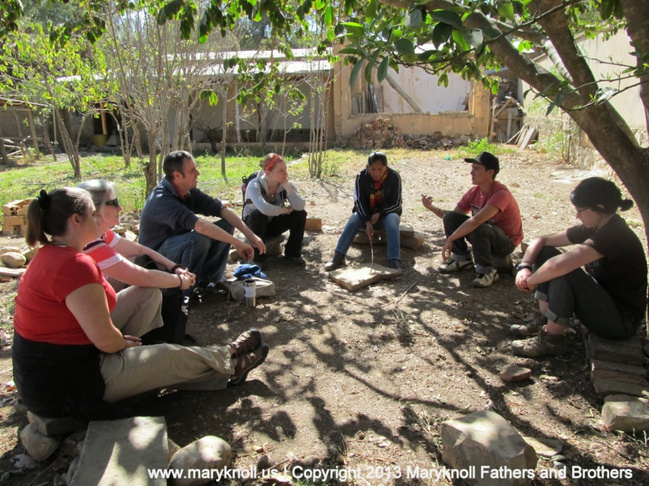Second Sunday of Easter
THE COURAGE TO DOUBT
PEACE BE WITH YOU.
1.PRAYER
Loving God, sometimes life is confusing and we are faced with questions and doubts. Give us the courage to bring those concerns to not only you, but also our faith communities. Give us the confidence to be honest in our unknowing, trusting that no matter what, you remain with us.
2. SHARING YOUR STORY
Share an occasion when you were fearful about revealing what you really thought or felt. What stopped you?
3. STORIES AROUND THE GLOBE

Missioners listen, dialogue and discern together in the worldwide synodal process.
I alway looked to Mother Teresa as a model of faith given her work with the poor around the world. When I read the book
“Mother Teresa: Come Be My Light,” I vividly remember feeling both a punch in the gut and incredible relief. To know that such an incredible woman, who had devoted her life to working for the poor in the name of God, had such intense doubt, was a strange encounter with the real. I thought only those with little faith doubted—people like me who cried out in the night and only heard silence. People who looked for God and found nothing. To learn that such a person like Mother Teresa also felt like God hid from her, that her prayers went unanswered and yet she continued to serve was nothing short of a miracle for me. She didn’t let her doubt and fear stop her from doing the mission God had planted on her heart. At that moment, I knew I too could carry on and serve God even when it felt impossible. Her words became my prayer: “Please pray for me … for there is such terrible darkness within me, as if everything was dead– Ask our Lord to give me courage.” Reflection by Jackie Hopper, Mission Educator.
4. GOSPEL STORY
4. GOSPEL STORY On the evening of that first day of the week, when the doors were locked, where the disciples were, for fear of the Jews, Jesus came and stood in their midst and said to them, “Peace be with you.” When he had said this, he showed them his hands and his side. The disciples rejoiced when they saw the Lord. Jesus said to them again, “Peace be with you. As the Father has sent me, so I send you.” And when he had said this, he breathed on them and said to them, “Receive the Holy Spirit. Whose sins you forgive are forgiven them, and whose sins you retain are retained.”
Thomas, called Didymus, one of the Twelve, was not with them when Jesus came. So the other disciples said to him, “We have seen the Lord.” But he said to them, “Unless I see the mark of the nails in his hands and put my finger into the nail marks and put my hand into his side, I will not believe.” Now a week later his disciples were again inside and Thomas was with them. Jesus came, although the doors were locked, and stood in their midst and said, “Peace be with you.” Then he said to Thomas, “Put your finger here and see my hands, and bring your hand and put it into my side, and do not be unbelieving, but believe.” Thomas answered and said to him, “My Lord and my God!” Jesus said to him, “Have you come to believe because you have seen me? Blessed are those who have not seen and have believed.” Now Jesus did many other signs in the presence of his disciples that are not written in this book.
But these are written that you may come to believe that Jesus is the Christ, the Son of God, and that through this belief you may have life in his name. – Jn 20:19-31
5. REFLECTION ON THE READINGS
Thomas openly voices his fears, cynicism and doubts. The courage of Thomas urges us to be more honest about our own doubts and concerns. If we are to walk together, this is exactly what the synodal path demands – the courage to be vulnerable enough to voice our doubts, differences of opinion, and disbeliefs and be a community that responds like Jesus did, with mercy and empathy.
6. FAITH SHARING
In what ways is the Spirit inviting you and your community to be better at listening to others who have doubts and may not agree with your beliefs?
7. GO FORTH
In order to walk alongside others, this requires each of us to recognize our own biases and assumptions we make about those we disagree with. Name 3 assumptions you often make about those you disagree with and how these may inhibit you from connecting with them. For inspiration, learn about Maryknollers embracing synodality all over the world.
8. PRAYER
Strengthen us Holy Spirit with humility and curiosity to honestly engage in dialogue with whoever you put in our path. Help us trust that you are present and we continue to grow and learn from others.